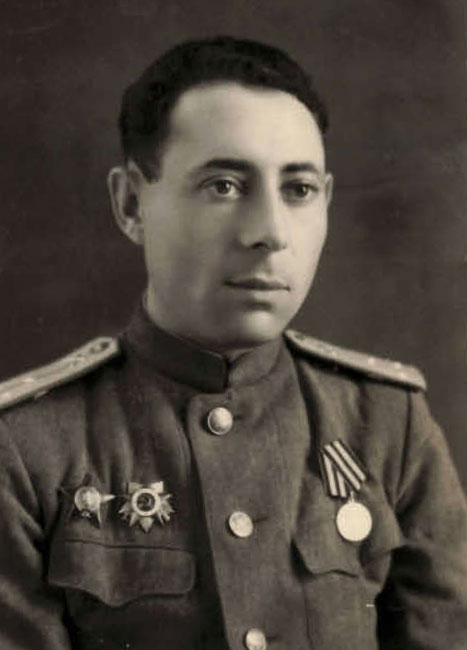Bentzion (Boris) Kats was born in 1919 in Dunaevtsy, Ukraine. As a young child Bentzion attended a heder (traditional Jewish elementary school). In 1939, after graduating from a Soviet state school, Bentzion was drafted into the Red Army, where he served in the artillery.
After the outbreak of the war between the Soviet Union and Nazi Germany on June 22, 1941, Bentzion Kats apparently fought in the Moscow region. Later his artillery unit defended the Road of Life, – the life-line for the blockaded city of Leningrad. In May 1942, while serving as a platoon commander on the North Caucasian Front, Sergeant Kats participated in the battle for the Kerch Peninsula in Crimea. Shortly afterwards he was assigned as an artillery man to a rapid deployment unit of the Red Army High Command. Around this time Bentzion's entire family – his parents, sister and two brothers, as well as members of his extended family, were murdered in Dunaevtsy by the Nazis, along with other Jews of the town. In 1943, after graduating from the artillery school for officers in Ufa, Junior Lieutenant Kats was assigned to command an anti-aircraft battery on the 1st Ukrainian Front, fighting in the Lvov (Lwów) - Sandomierz Offensive (July - August, 1944), liberating western Ukraine and eastern Poland. In April 1944 Bentzion Kats was decorated with the Order of the Patriotic War, 2nd class. Subsequently he fought in Hungary and Austria, ending the war in Vienna. During the war the artillery men under his command shot down 9 German aircraft. For this achievement after the end of the war, in October 1945, Bentzion Kats was decorated with the Order of the Red Star.
Kats pursued a military career in the postwar period. In 1947, after marrying Klara (Chaia) Rudman, Boris was supposed to serve in Germany, but when he reached the Soviet border, he was informed that his position had already been filled. Boris attributed this to antisemitism in the Red Army during the first years after the war. In 1948-1950 he served as the commander of an artillery battery in Azerbaijan and, afterwards, as the commander of an artillery company with a tank regiment in the Carpathian Military District. Following the Hungarian Revolution (October-November 1956), Kats was sent to Hungary. After completing a course for radar systems operators, he served as a commander of the regiment intelligence with the tank division and as a deputy to the head of the regimental headquarters. For several months he also served as the commandant of the city of Székesfehérvár. In 1960, after being demobilized with the rank of major, Boris Kats and his family settled in the city of Chernovtsy, Ukraine. He worked as a construction engineer in the municipal unit that supplied water- and gas pipes to the city.
Boris Kats died in 1986 in Chernovtsy.







